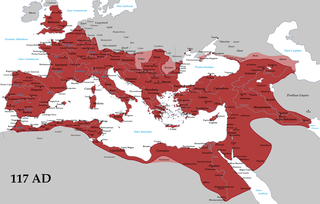The a rationibus was the secretary of finance in the Roman Empire and in charge of the imperial treasury, the fiscus . His responsibilities involved monitoring the state's revenues and expenditures and maintaining the accounts of the fiscus, giving the a rationibus considerable influence. [1]

The Roman Empire was the post-Republican period of ancient Rome, consisting of large territorial holdings around the Mediterranean sea in Europe, North Africa and West Asia ruled by emperors. From the accession of Caesar Augustus to the military anarchy of the third century, it was a principate with Italy as metropole of the provinces and its city of Rome as sole capital. The Roman Empire was then ruled by multiple emperors and divided into a Western Roman Empire, based in Milan and later Ravenna, and an Eastern Roman Empire, based in Nicomedia and later Constantinople. Rome remained the nominal capital of both parts until 476 AD, when it sent the imperial insignia to Constantinople following the capture of Ravenna by the barbarians of Odoacer and the subsequent deposition of Romulus Augustus. The fall of the Western Roman Empire to Germanic kings, along with the hellenization of the Eastern Roman Empire into the Byzantine Empire, is conventionally used to mark the end of Ancient Rome and the beginning of the Middle Ages.
Fiscus, from which comes the English term fiscal, was the name of the personal chest of the emperors of Rome.
The role of the a rationibus was originally created by Augustus, who needed accurate and comprehensive accounts of the state's finances in order to exercise budgetary control, and was thus given to members of his household, probably freedmen. This role was then institutionalized in the position of the a rationibus, who was paid a salary by the aerarium and given an office in the Palatine bureaus, under Tiberius. [2] Roman patrician families such as the Junii Silani may also have designated their accountants as "a rationibus", although this custom fell out of practice when the imperial office of the a rationibus became institutionalized and had vanished at the latest under Nero's reign. [3] Within his role as accountant, the careful bookkeeping of military expenditures, the costs of the public distribution of grain, religious constructions and infrastructure projects, but also the embellishment of the imperial palace, and project public revenues, e.g. from the Empire's various mines, were among the a rationibus' most important tasks. [3] Moreover, the a rationibus was also responsible for the behavior of the magistrates of the fiscus and public complaints were addressed to his office. [4] The praepositus a rationibus was helped by his chief subordinate, the proximus a rationibus, and strongly relied on the continuous confidence of the emperor, as evidenced by the consequences of Tiberius Iul. Aug. lib.'s dismissal. [5] Sometimes, the offices of the a rationibus and ab epistulis , the secretary in charge of the imperial correspondence, [6] were joined, e.g. in the case of Tiberius Claudius Vibianus Tertullus. [7]

Augustus was a Roman statesman and military leader who was the first emperor of the Roman Empire, reigning from 27 BC until his death in AD 14. His status as the founder of the Roman Principate has consolidated an enduring legacy as one of the most effective and controversial leaders in human history. The reign of Augustus initiated an era of relative peace known as the Pax Romana. The Roman world was largely free from large-scale conflict for more than two centuries, despite continuous wars of imperial expansion on the Empire's frontiers and the year-long civil war known as the "Year of the Four Emperors" over the imperial succession.
Aerarium was the name given in Ancient Rome to the public treasury, and in a secondary sense to the public finances.

Tiberius was the second Roman emperor, reigning from 14 AD to 37 AD, succeeding Augustus.
The office of a rationibus was initially held by freedmen [8] such as Pallas, Phaon, and the father of Claudius Etruscus. However, from the 2nd century AD on (i.e., around the reigns of Trajan and Hadrian), the position was occupied only by Equestrians ( Equites ) after the reputation of freedmen had been blackened due to their undue influence at the imperial court and several corruption affairs. The office of the a rationibus was abolished through Diocletian's tetrarchic reforms, which put the management of the imperial finances during the 4th and 5th century AD under the purview of the comes sacrarum largitionum (master of the sacred largess).
Marcus Antonius Pallas was a prominent Greek freedman and secretary during the reigns of the Roman Emperors Claudius and Nero. His younger brother was Marcus Antonius Felix, a procurator of Iudaea Province. According to Tacitus, Pallas and Felix descended from the Greek Kings of Arcadia.

In Greek mythology, Phaon was a boatman of Mitylene in Lesbos. He was old and ugly when Aphrodite came to his boat. She put on the guise of a crone. Phaon ferried her over to Asia Minor and accepted no payment for doing so. In return, she gave him a box of ointment. When he rubbed it on himself, he became young and beautiful. Many were captivated by his beauty.

Trajan was Roman emperor from 98 to 117. Officially declared by the Senate optimus princeps, Trajan is remembered as a successful soldier-emperor who presided over the greatest military expansion in Roman history, leading the empire to attain its maximum territorial extent by the time of his death. He is also known for his philanthropic rule, overseeing extensive public building programs and implementing social welfare policies, which earned him his enduring reputation as the second of the Five Good Emperors who presided over an era of peace and prosperity in the Mediterranean world.


